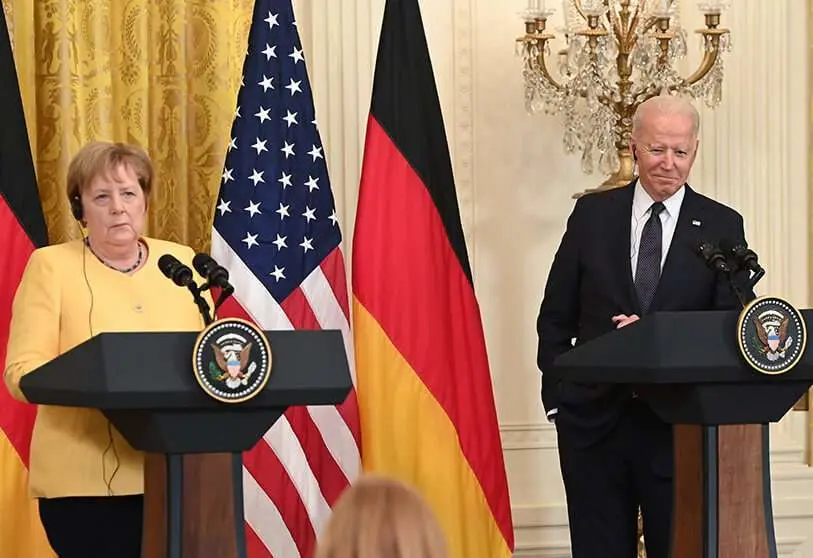Washington and Berlin come to an agreement on Nord Stream, the Russian gas pipeline

Germany and the United States have reached a deal on Nord Stream 2, a pipeline that will transport Russian gas to the European country via the Baltic Sea. Washington had expressed its rejection of the construction of this infrastructure on several occasions, as the pipeline would increase Russia's influence in Europe. Another reason for the US objection was Ukraine.
Kiev, which has been at loggerheads with Moscow since the Crimean crisis of 2014, could be affected by Nord Stream 2. The transit of Russian gas through Ukrainian territory is a major source of revenue for the country, earning up to $3 billion a year. The new pipeline would deprive Kiev of these tariffs, and Russia could use energy as a political weapon to exert pressure on the country, according to Ukrainian authorities. Poland, for its part, agrees with neighbouring Ukraine and sees the pipeline as a threat to Central Europe.
However, Russia is not the only country interested in Nord Stream 2. Germany, of course, is also in favour of the project. Russia's state-owned Gazprom is in charge of construction, but has investors from France's Engie, Austria's OMV, Britain's Shell and Germany's Uniper and Wintershall DEA. Therefore, although some European countries are opposed to the pipeline, there are others who welcome it, as they stand to benefit from it.

Joe Biden, faced with this division in Europe, has chosen to allow Nord Stream 2 to be completed. However, Biden will also defend the interests of the countries that oppose it. Through a pact with Berlin, Washington has ensured that it will impose sanctions if Moscow uses energy as a weapon. Germany has reiterated Biden's position. "If Russia attempts to use energy as a weapon or commits further aggressive acts against Ukraine, Germany will take action at the national level and press for effective measures at the European level, including sanctions," announced a joint statement by the two countries.
The German and US governments will also support Ukraine financially through a $50 million investment in Ukrainian green technology, including renewable energy and related industries. To boost this fund, Germany will start with a 150 million euro grant and a 60 million euro 'resilience package' to support Ukraine's energy security. Berlin will also try to persuade Moscow to extend a gas transit agreement through Ukraine that ends in 2024. Indeed, it will appoint a special envoy before September to support negotiations.

However, political support and strong economic backing have not convinced Kiev. Both the Ukrainian and Polish governments consider the agreement 'insufficient' to reduce 'the threats created by Nord Stream 2'. Both countries have called on Germany and the US to "adequately address the security crisis in the region, of which Russia is the only beneficiary".
"This decision has created a political, military and energy threat to Ukraine and Central Europe, while increasing Russia's potential to destabilise the security situation in Europe, perpetuating divisions between NATO member states and the European Union," Kiev and Warsaw added. Ukraine has even requested consultations with the European Commission and Germany.

In the US, Republicans have also criticised the pact, pointing to Biden's "betrayal" of Ukraine while "strengthening" Putin. The Trump administration imposed sanctions on some figures involved in the construction of Nord Stream 2. State Department spokesman Ned Price defended the current administration by assuring that they still oppose the pipeline, but that it was 90 per cent complete when Biden took office, so they felt they could not stop it with sanctions.
To reiterate Biden's foreign policy commitment to Ukraine, the US president will host his Ukrainian counterpart, Volodimir Zelenski, at the White House on 30 August. This visit "will reaffirm the United States' steadfast support for Ukraine's sovereignty and territorial integrity in the face of Russia's continued aggression in the Donbas and Crimea", according to White House spokesperson Jen Psaki.

The US has supported the Ukrainian government in the border crisis with Russia in April. They are also working together on Operation Sea Breeze 2021 in the Black Sea. Ukraine represents a key ally of Washington and NATO.
Nord Stream 2 has brought Germany and Russia closer together on energy issues. German Chancellor Angela Merkel and Russian President Vladimir Putin held a telephone conversation on Wednesday about the pipeline. They also discussed the transit of gas through Ukraine, according to the chancellor's spokeswoman, Ulrike Demmer. Sources said Merkel and Putin were "satisfied" with the progress of the pipeline.

Russian presidential spokesman Dmitry Peskov spoke of a "certain understanding" between Merkel and Putin. On the agreement between Germany and the United States, he recalled that his country "has always systematically rejected any accusation that it uses energy resources as an instrument of political pressure".
Anatoli Antonov, the Russian ambassador to the United States, criticised the "hostile tone" in a statement released by the Russian news agency TASS. Antonov claims that these statements contradict the "spirit of the talks between the two presidents in Geneva on 16 June".









